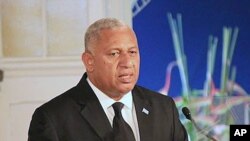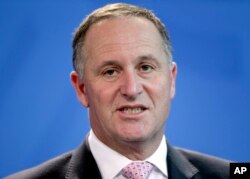John Key on Thursday becomes the first New Zealand Prime Minister to visit Fiji since a military coup there in 2006. Key says his two-day trip is in recognition of the South Pacific nation's return to elected government, although Key has said there are still shortcomings in the democratic process.
Fiji was part of an arc of instability that included East Timor, Papua New Guinea and the Solomon Islands.
Coups and social unrest made two regional heavyweights, New Zealand and Australia, increasingly nervous about security.
Those fears worsened in 2006 when the military seized power in Fiji.
But much has changed. Elections were held two years ago and the military commander, Frank Bainimarama, who overthrew an elected government ten years ago, is now Fiji's Prime Minister.
Sanctions imposed on Fiji by the international community, including the United States and Australia, have been lifted, and the country has been re-admitted to the Commonwealth grouping of former British colonies.
On Thursday, Bainimarama's New Zealand counterpart John Key arrived in the South Pacific archipelago to show support for democracy, although he has stressed that more work needs to be done.
He will hold talks with senior Fijian officials and assess progress since the South Pacific nation was struck earlier this year by Cyclone Winston, the most powerful storm ever to make landfall in the southern hemisphere.
“Bula vinaka (traditional Fijian greeting). Well, later on this afternoon I am off to Suva in Fiji, the first New Zealand Prime Minister to go to Fiji for nearly a decade now, so looking forward to going back and talking to Prime Minister Frank Bainimarama. There are a lot of things for us to discuss. Fiji is obviously a strong Pacific nation and one that we have a lot of engagement with. New Zealanders will remember the devastation that took place as a result of Cyclone Winston and, of course, the big role that New Zealand is playing in terms of giving support to the people of Fiji, so first hand looking forward to seeing that rescue and that recovery work being undertaken now, and obviously to get a bit of a sense of how the people of Fiji are recovering after such a devastating cyclone,” said Key.
More than 40 people died when Cyclone Winston struck.
Some critics insist that Fijian democracy is still suffering under the current government and have said Prime Minister Bainimarama has muzzled the press and stifled dissent.
Elections held in September 2014 were considered to be “credible” by international observers. The next election is due in two years’ time.
Fiji is home to about 900,000 people, and lies about two-thirds of the way from Hawaii to New Zealand in the South Pacific Ocean.





